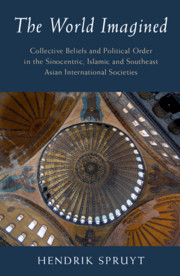 The World Imagined
The World Imagined Book contents
- The World Imagined
- LSE International Studies
- The World Imagined
- Copyright page
- Dedication
- Contents
- Figures
- Preface
- Acknowledgments
- A Note on Transliteration
- 1 Introduction
- Part I Beyond the Westphalian Gaze
- Part II The East Asian Sino-centric Order
- Part III The Islamic Cultural–Historical Community
- 6 Lords of the Auspicious Conjunction
- 7 Collective Imagination and the Conduct of Interpolity Relations
- Part IV Collective Imagination among the Polities of Southeast Asia
- Bibliography
- Index
7 - Collective Imagination and the Conduct of Interpolity Relations
from Part III - The Islamic Cultural–Historical Community
Published online by Cambridge University Press: 18 June 2020
- The World Imagined
- LSE International Studies
- The World Imagined
- Copyright page
- Dedication
- Contents
- Figures
- Preface
- Acknowledgments
- A Note on Transliteration
- 1 Introduction
- Part I Beyond the Westphalian Gaze
- Part II The East Asian Sino-centric Order
- Part III The Islamic Cultural–Historical Community
- 6 Lords of the Auspicious Conjunction
- 7 Collective Imagination and the Conduct of Interpolity Relations
- Part IV Collective Imagination among the Polities of Southeast Asia
- Bibliography
- Index
Summary
The Islamic empires, and specifically the nineteenth-century Ottoman Empire, were not antithetical to the Westphalian principles of international order. The claim of Islamic and Ottoman incompatibility had more to do with European colonial ambitions. Altering their universalist claims, Ottoman rulers engaged in significant adjustments to Western principles of international diplomacy and international relations. Studying the Islamic world provides insights into how a regional order might be based on a shared collective identity rather than on material dominance by a hegemonic power. The Ottoman Empire provides a perfect case to examine adjustment at the peak of Western imperial expansion and confrontation with the West.
- Type
- Chapter
- Information
- The World ImaginedCollective Beliefs and Political Order in the Sinocentric, Islamic and Southeast Asian International Societies, pp. 214 - 250Publisher: Cambridge University PressPrint publication year: 2020
